MOD003333 Law of Contract: Critically Analyzing Privity Doctrine
VerifiedAdded on 2023/01/11
|8
|2634
|59
Essay
AI Summary
This essay provides a critical analysis of the doctrine of privity of contract within English contract law, focusing on the statement that only parties to a contractual relationship can take action or be subjected to action in the event of a breach. The essay defines a contract, outlines its essential elements, and delves into the concept of privity, highlighting exceptions where third-party beneficiaries can be involved. It further examines circumstances under which a third party can overcome the doctrine, including agency, trusts, estoppel, and unjust enrichment, supported by relevant case laws. The Contracts (Rights of Third Parties) Act 1999 (UK) is also discussed as a statutory exception. Landmark cases such as Price v. Easton, Winterbottom v. Wright, and MacPherson v. Buick Motor Co. are referenced to illustrate the application of the doctrine.
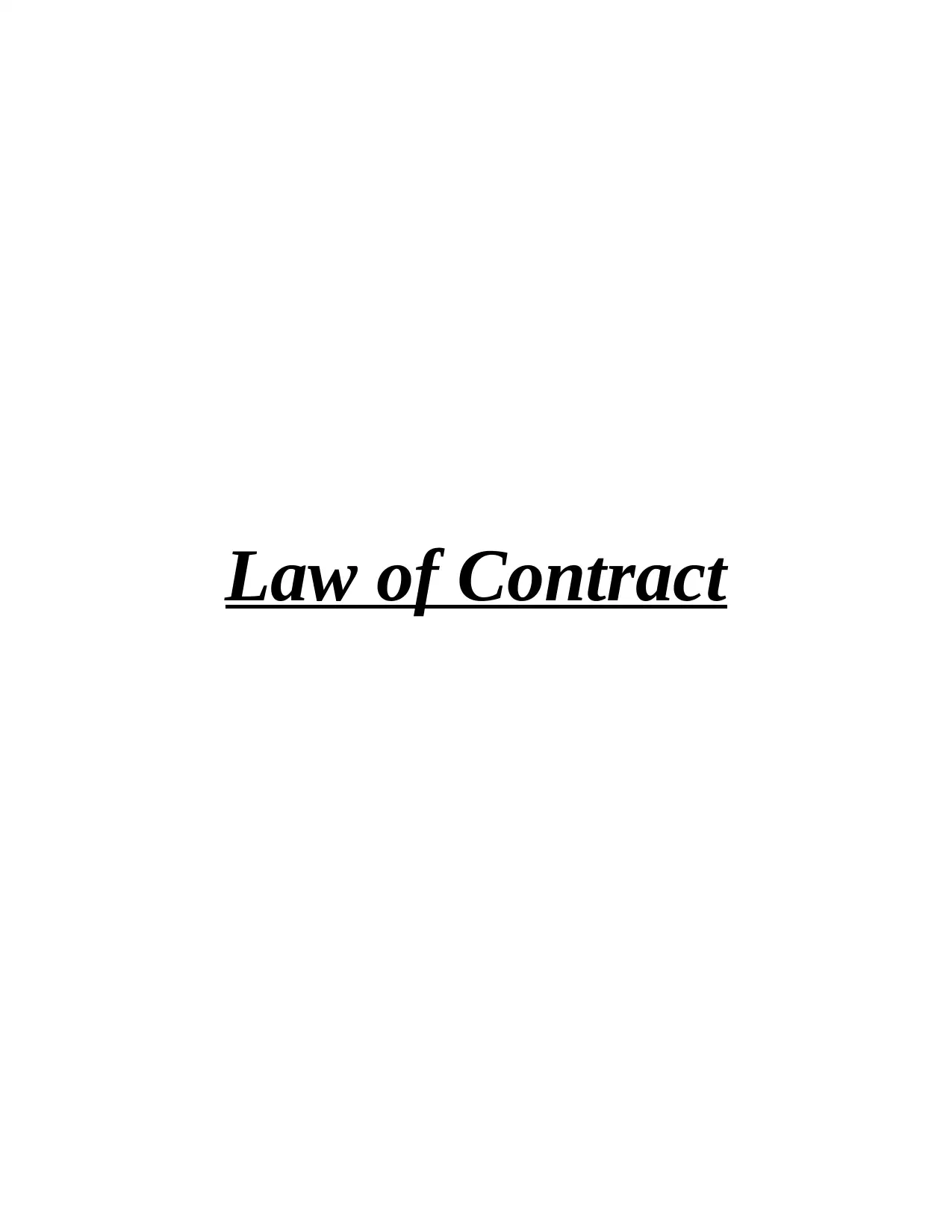
Law of Contract
Paraphrase This Document
Need a fresh take? Get an instant paraphrase of this document with our AI Paraphraser
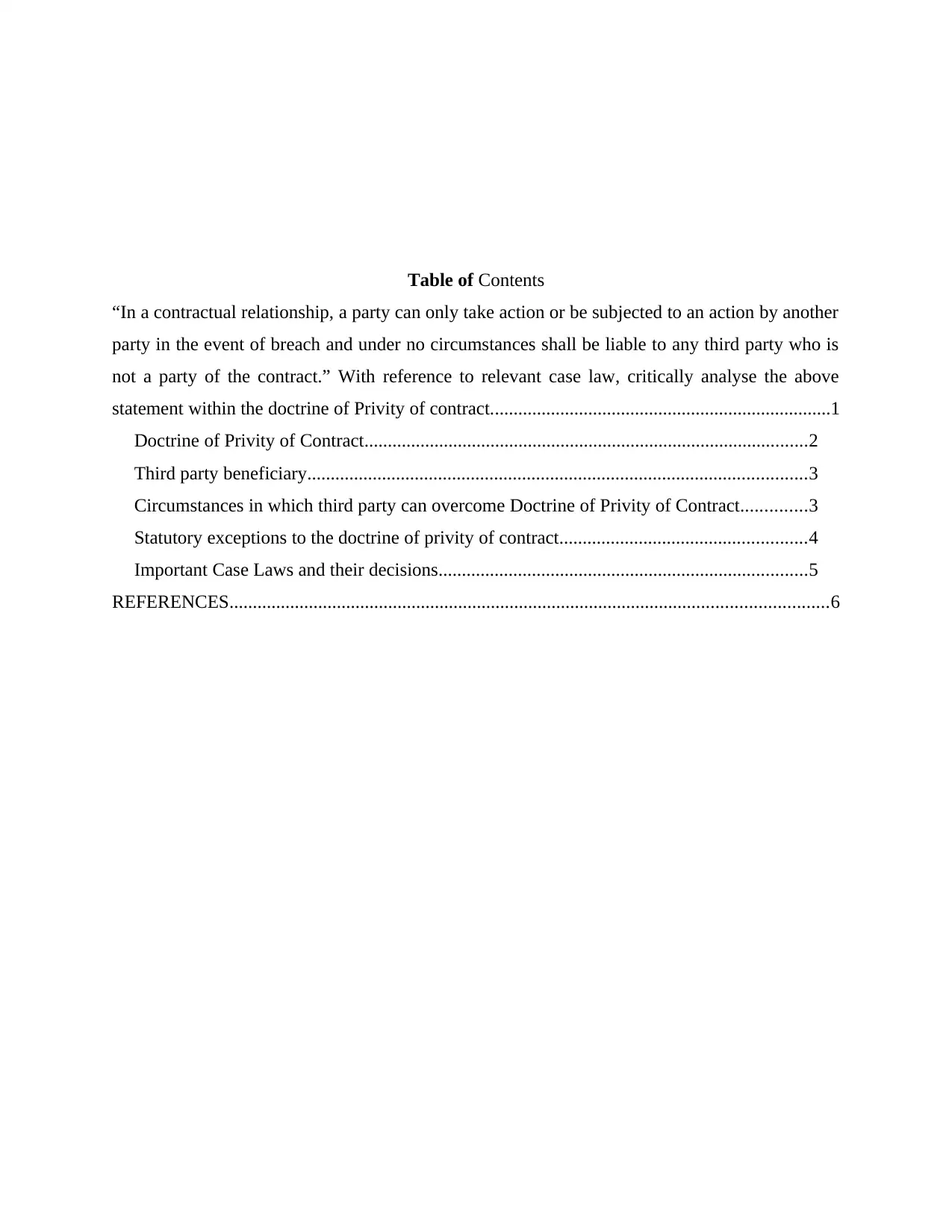
Table of Contents
“In a contractual relationship, a party can only take action or be subjected to an action by another
party in the event of breach and under no circumstances shall be liable to any third party who is
not a party of the contract.” With reference to relevant case law, critically analyse the above
statement within the doctrine of Privity of contract.........................................................................1
Doctrine of Privity of Contract...............................................................................................2
Third party beneficiary...........................................................................................................3
Circumstances in which third party can overcome Doctrine of Privity of Contract..............3
Statutory exceptions to the doctrine of privity of contract.....................................................4
Important Case Laws and their decisions...............................................................................5
REFERENCES................................................................................................................................6
“In a contractual relationship, a party can only take action or be subjected to an action by another
party in the event of breach and under no circumstances shall be liable to any third party who is
not a party of the contract.” With reference to relevant case law, critically analyse the above
statement within the doctrine of Privity of contract.........................................................................1
Doctrine of Privity of Contract...............................................................................................2
Third party beneficiary...........................................................................................................3
Circumstances in which third party can overcome Doctrine of Privity of Contract..............3
Statutory exceptions to the doctrine of privity of contract.....................................................4
Important Case Laws and their decisions...............................................................................5
REFERENCES................................................................................................................................6
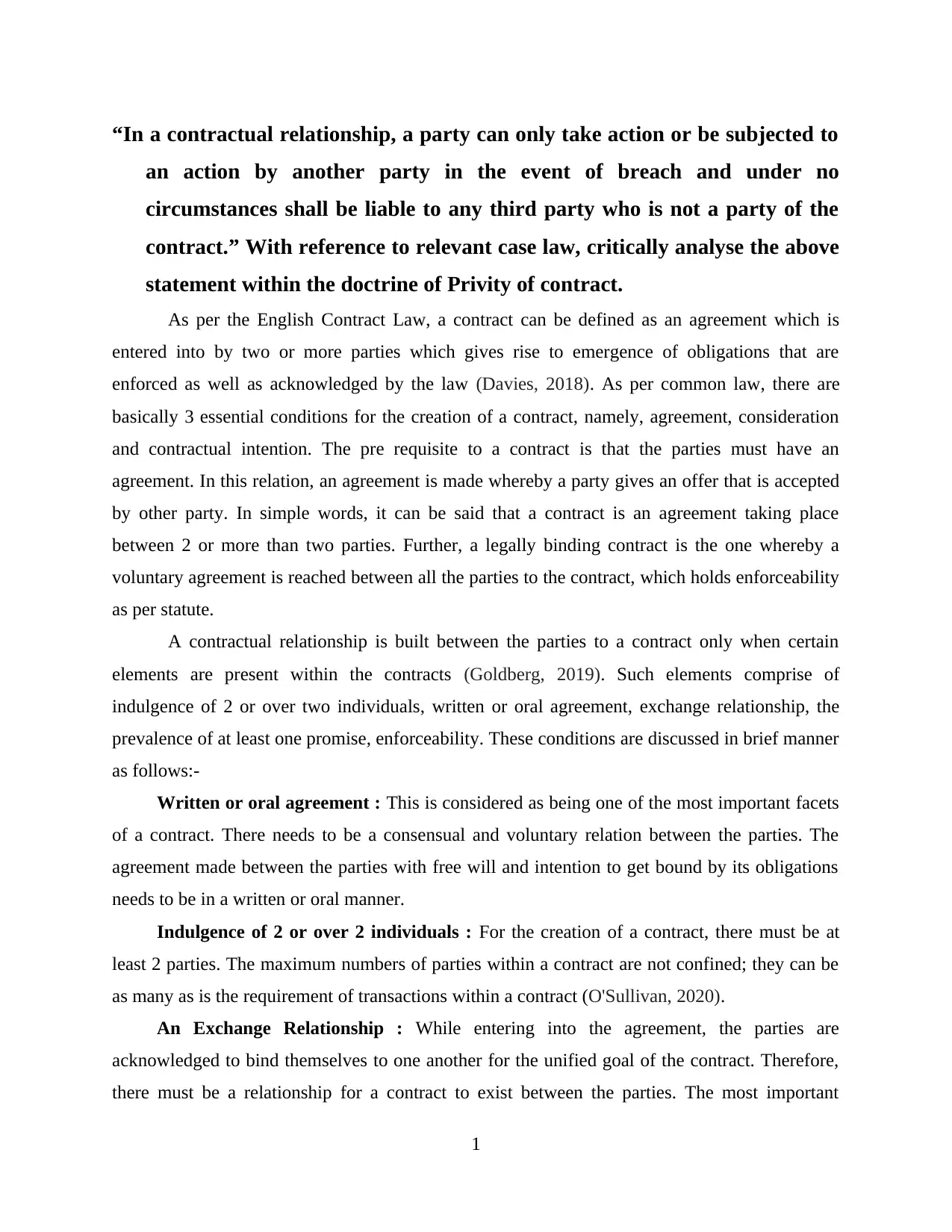
“In a contractual relationship, a party can only take action or be subjected to
an action by another party in the event of breach and under no
circumstances shall be liable to any third party who is not a party of the
contract.” With reference to relevant case law, critically analyse the above
statement within the doctrine of Privity of contract.
As per the English Contract Law, a contract can be defined as an agreement which is
entered into by two or more parties which gives rise to emergence of obligations that are
enforced as well as acknowledged by the law (Davies, 2018). As per common law, there are
basically 3 essential conditions for the creation of a contract, namely, agreement, consideration
and contractual intention. The pre requisite to a contract is that the parties must have an
agreement. In this relation, an agreement is made whereby a party gives an offer that is accepted
by other party. In simple words, it can be said that a contract is an agreement taking place
between 2 or more than two parties. Further, a legally binding contract is the one whereby a
voluntary agreement is reached between all the parties to the contract, which holds enforceability
as per statute.
A contractual relationship is built between the parties to a contract only when certain
elements are present within the contracts (Goldberg, 2019). Such elements comprise of
indulgence of 2 or over two individuals, written or oral agreement, exchange relationship, the
prevalence of at least one promise, enforceability. These conditions are discussed in brief manner
as follows:-
Written or oral agreement : This is considered as being one of the most important facets
of a contract. There needs to be a consensual and voluntary relation between the parties. The
agreement made between the parties with free will and intention to get bound by its obligations
needs to be in a written or oral manner.
Indulgence of 2 or over 2 individuals : For the creation of a contract, there must be at
least 2 parties. The maximum numbers of parties within a contract are not confined; they can be
as many as is the requirement of transactions within a contract (O'Sullivan, 2020).
An Exchange Relationship : While entering into the agreement, the parties are
acknowledged to bind themselves to one another for the unified goal of the contract. Therefore,
there must be a relationship for a contract to exist between the parties. The most important
1
an action by another party in the event of breach and under no
circumstances shall be liable to any third party who is not a party of the
contract.” With reference to relevant case law, critically analyse the above
statement within the doctrine of Privity of contract.
As per the English Contract Law, a contract can be defined as an agreement which is
entered into by two or more parties which gives rise to emergence of obligations that are
enforced as well as acknowledged by the law (Davies, 2018). As per common law, there are
basically 3 essential conditions for the creation of a contract, namely, agreement, consideration
and contractual intention. The pre requisite to a contract is that the parties must have an
agreement. In this relation, an agreement is made whereby a party gives an offer that is accepted
by other party. In simple words, it can be said that a contract is an agreement taking place
between 2 or more than two parties. Further, a legally binding contract is the one whereby a
voluntary agreement is reached between all the parties to the contract, which holds enforceability
as per statute.
A contractual relationship is built between the parties to a contract only when certain
elements are present within the contracts (Goldberg, 2019). Such elements comprise of
indulgence of 2 or over two individuals, written or oral agreement, exchange relationship, the
prevalence of at least one promise, enforceability. These conditions are discussed in brief manner
as follows:-
Written or oral agreement : This is considered as being one of the most important facets
of a contract. There needs to be a consensual and voluntary relation between the parties. The
agreement made between the parties with free will and intention to get bound by its obligations
needs to be in a written or oral manner.
Indulgence of 2 or over 2 individuals : For the creation of a contract, there must be at
least 2 parties. The maximum numbers of parties within a contract are not confined; they can be
as many as is the requirement of transactions within a contract (O'Sullivan, 2020).
An Exchange Relationship : While entering into the agreement, the parties are
acknowledged to bind themselves to one another for the unified goal of the contract. Therefore,
there must be a relationship for a contract to exist between the parties. The most important
1
⊘ This is a preview!⊘
Do you want full access?
Subscribe today to unlock all pages.

Trusted by 1+ million students worldwide
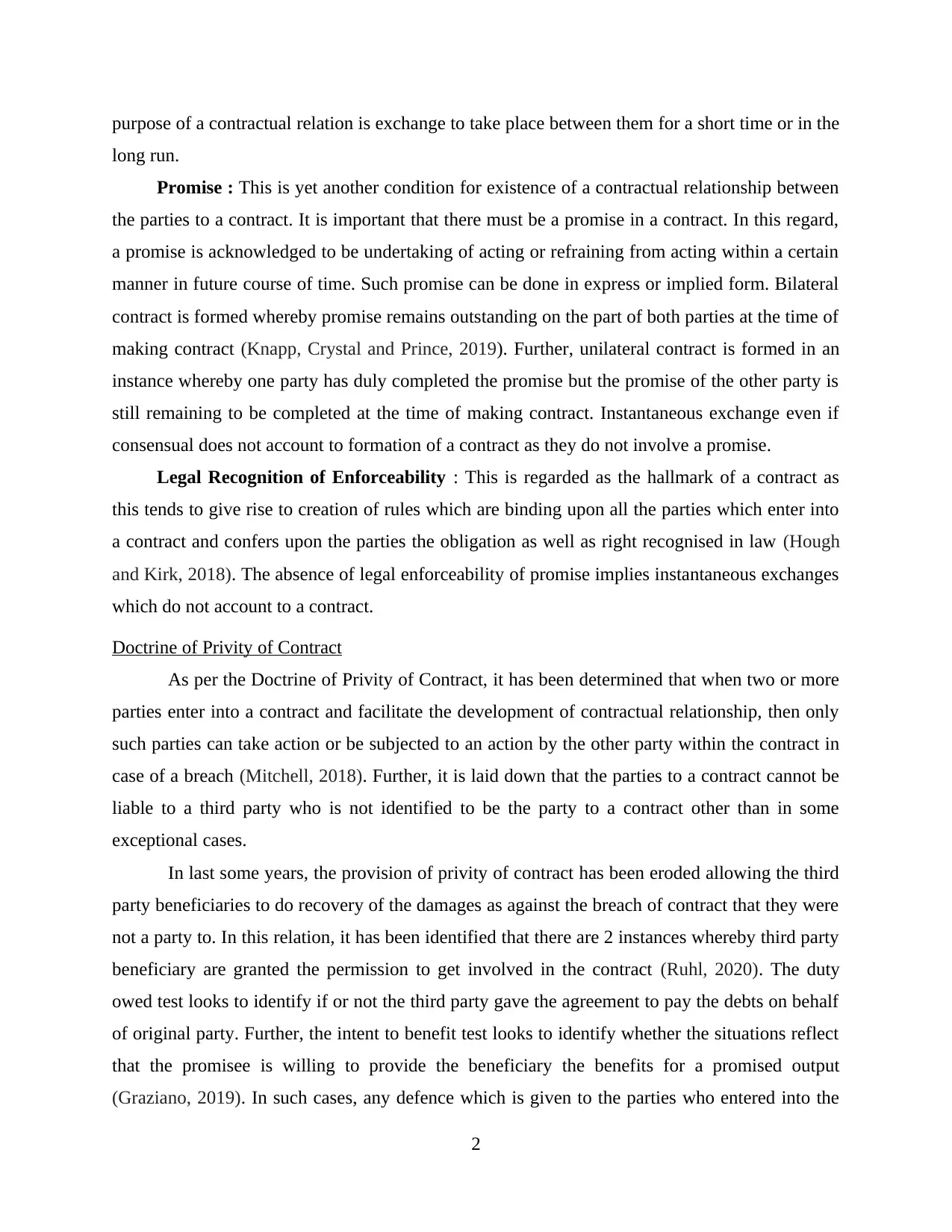
purpose of a contractual relation is exchange to take place between them for a short time or in the
long run.
Promise : This is yet another condition for existence of a contractual relationship between
the parties to a contract. It is important that there must be a promise in a contract. In this regard,
a promise is acknowledged to be undertaking of acting or refraining from acting within a certain
manner in future course of time. Such promise can be done in express or implied form. Bilateral
contract is formed whereby promise remains outstanding on the part of both parties at the time of
making contract (Knapp, Crystal and Prince, 2019). Further, unilateral contract is formed in an
instance whereby one party has duly completed the promise but the promise of the other party is
still remaining to be completed at the time of making contract. Instantaneous exchange even if
consensual does not account to formation of a contract as they do not involve a promise.
Legal Recognition of Enforceability : This is regarded as the hallmark of a contract as
this tends to give rise to creation of rules which are binding upon all the parties which enter into
a contract and confers upon the parties the obligation as well as right recognised in law (Hough
and Kirk, 2018). The absence of legal enforceability of promise implies instantaneous exchanges
which do not account to a contract.
Doctrine of Privity of Contract
As per the Doctrine of Privity of Contract, it has been determined that when two or more
parties enter into a contract and facilitate the development of contractual relationship, then only
such parties can take action or be subjected to an action by the other party within the contract in
case of a breach (Mitchell, 2018). Further, it is laid down that the parties to a contract cannot be
liable to a third party who is not identified to be the party to a contract other than in some
exceptional cases.
In last some years, the provision of privity of contract has been eroded allowing the third
party beneficiaries to do recovery of the damages as against the breach of contract that they were
not a party to. In this relation, it has been identified that there are 2 instances whereby third party
beneficiary are granted the permission to get involved in the contract (Ruhl, 2020). The duty
owed test looks to identify if or not the third party gave the agreement to pay the debts on behalf
of original party. Further, the intent to benefit test looks to identify whether the situations reflect
that the promisee is willing to provide the beneficiary the benefits for a promised output
(Graziano, 2019). In such cases, any defence which is given to the parties who entered into the
2
long run.
Promise : This is yet another condition for existence of a contractual relationship between
the parties to a contract. It is important that there must be a promise in a contract. In this regard,
a promise is acknowledged to be undertaking of acting or refraining from acting within a certain
manner in future course of time. Such promise can be done in express or implied form. Bilateral
contract is formed whereby promise remains outstanding on the part of both parties at the time of
making contract (Knapp, Crystal and Prince, 2019). Further, unilateral contract is formed in an
instance whereby one party has duly completed the promise but the promise of the other party is
still remaining to be completed at the time of making contract. Instantaneous exchange even if
consensual does not account to formation of a contract as they do not involve a promise.
Legal Recognition of Enforceability : This is regarded as the hallmark of a contract as
this tends to give rise to creation of rules which are binding upon all the parties which enter into
a contract and confers upon the parties the obligation as well as right recognised in law (Hough
and Kirk, 2018). The absence of legal enforceability of promise implies instantaneous exchanges
which do not account to a contract.
Doctrine of Privity of Contract
As per the Doctrine of Privity of Contract, it has been determined that when two or more
parties enter into a contract and facilitate the development of contractual relationship, then only
such parties can take action or be subjected to an action by the other party within the contract in
case of a breach (Mitchell, 2018). Further, it is laid down that the parties to a contract cannot be
liable to a third party who is not identified to be the party to a contract other than in some
exceptional cases.
In last some years, the provision of privity of contract has been eroded allowing the third
party beneficiaries to do recovery of the damages as against the breach of contract that they were
not a party to. In this relation, it has been identified that there are 2 instances whereby third party
beneficiary are granted the permission to get involved in the contract (Ruhl, 2020). The duty
owed test looks to identify if or not the third party gave the agreement to pay the debts on behalf
of original party. Further, the intent to benefit test looks to identify whether the situations reflect
that the promisee is willing to provide the beneficiary the benefits for a promised output
(Graziano, 2019). In such cases, any defence which is given to the parties who entered into the
2
Paraphrase This Document
Need a fresh take? Get an instant paraphrase of this document with our AI Paraphraser
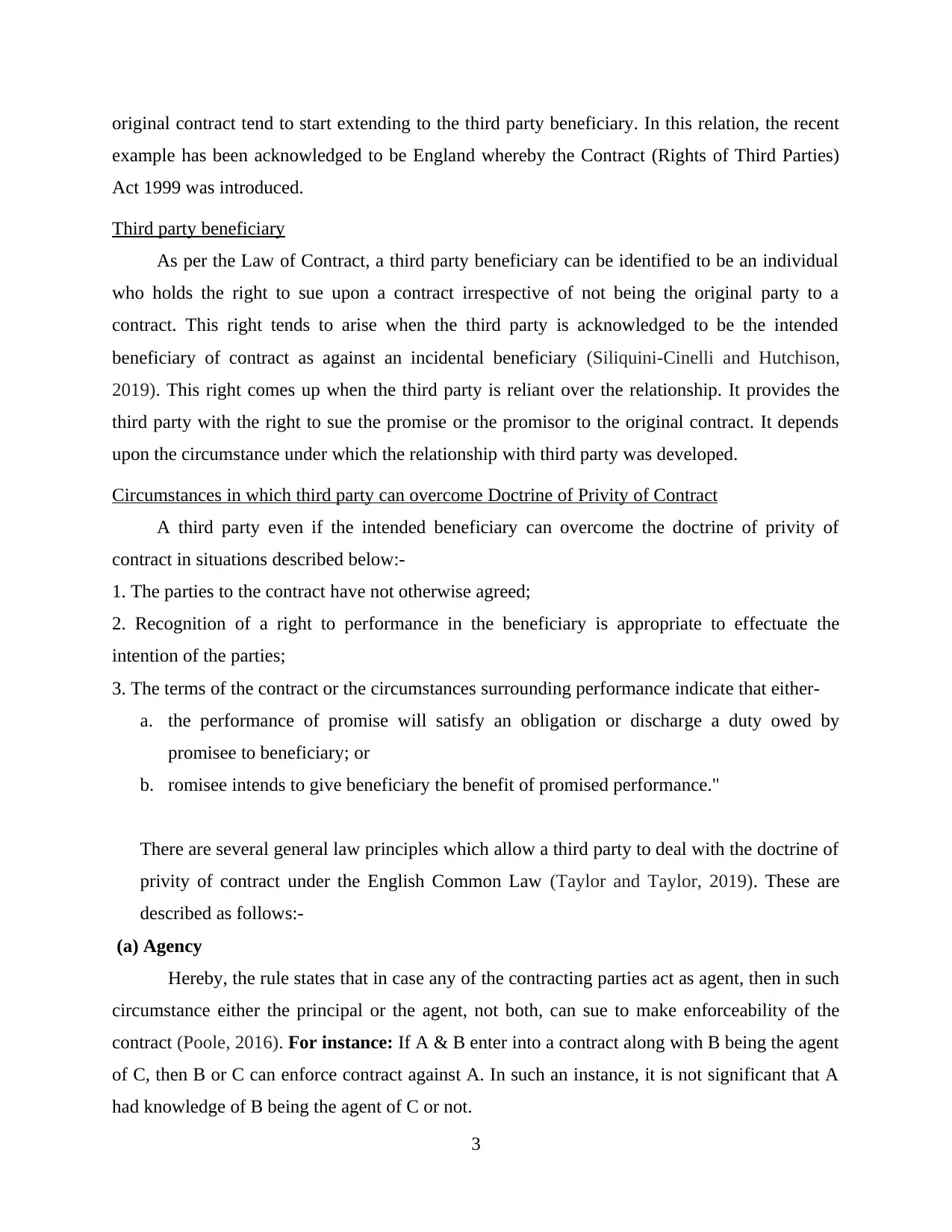
original contract tend to start extending to the third party beneficiary. In this relation, the recent
example has been acknowledged to be England whereby the Contract (Rights of Third Parties)
Act 1999 was introduced.
Third party beneficiary
As per the Law of Contract, a third party beneficiary can be identified to be an individual
who holds the right to sue upon a contract irrespective of not being the original party to a
contract. This right tends to arise when the third party is acknowledged to be the intended
beneficiary of contract as against an incidental beneficiary (Siliquini-Cinelli and Hutchison,
2019). This right comes up when the third party is reliant over the relationship. It provides the
third party with the right to sue the promise or the promisor to the original contract. It depends
upon the circumstance under which the relationship with third party was developed.
Circumstances in which third party can overcome Doctrine of Privity of Contract
A third party even if the intended beneficiary can overcome the doctrine of privity of
contract in situations described below:-
1. The parties to the contract have not otherwise agreed;
2. Recognition of a right to performance in the beneficiary is appropriate to effectuate the
intention of the parties;
3. The terms of the contract or the circumstances surrounding performance indicate that either-
a. the performance of promise will satisfy an obligation or discharge a duty owed by
promisee to beneficiary; or
b. romisee intends to give beneficiary the benefit of promised performance."
There are several general law principles which allow a third party to deal with the doctrine of
privity of contract under the English Common Law (Taylor and Taylor, 2019). These are
described as follows:-
(a) Agency
Hereby, the rule states that in case any of the contracting parties act as agent, then in such
circumstance either the principal or the agent, not both, can sue to make enforceability of the
contract (Poole, 2016). For instance: If A & B enter into a contract along with B being the agent
of C, then B or C can enforce contract against A. In such an instance, it is not significant that A
had knowledge of B being the agent of C or not.
3
example has been acknowledged to be England whereby the Contract (Rights of Third Parties)
Act 1999 was introduced.
Third party beneficiary
As per the Law of Contract, a third party beneficiary can be identified to be an individual
who holds the right to sue upon a contract irrespective of not being the original party to a
contract. This right tends to arise when the third party is acknowledged to be the intended
beneficiary of contract as against an incidental beneficiary (Siliquini-Cinelli and Hutchison,
2019). This right comes up when the third party is reliant over the relationship. It provides the
third party with the right to sue the promise or the promisor to the original contract. It depends
upon the circumstance under which the relationship with third party was developed.
Circumstances in which third party can overcome Doctrine of Privity of Contract
A third party even if the intended beneficiary can overcome the doctrine of privity of
contract in situations described below:-
1. The parties to the contract have not otherwise agreed;
2. Recognition of a right to performance in the beneficiary is appropriate to effectuate the
intention of the parties;
3. The terms of the contract or the circumstances surrounding performance indicate that either-
a. the performance of promise will satisfy an obligation or discharge a duty owed by
promisee to beneficiary; or
b. romisee intends to give beneficiary the benefit of promised performance."
There are several general law principles which allow a third party to deal with the doctrine of
privity of contract under the English Common Law (Taylor and Taylor, 2019). These are
described as follows:-
(a) Agency
Hereby, the rule states that in case any of the contracting parties act as agent, then in such
circumstance either the principal or the agent, not both, can sue to make enforceability of the
contract (Poole, 2016). For instance: If A & B enter into a contract along with B being the agent
of C, then B or C can enforce contract against A. In such an instance, it is not significant that A
had knowledge of B being the agent of C or not.
3
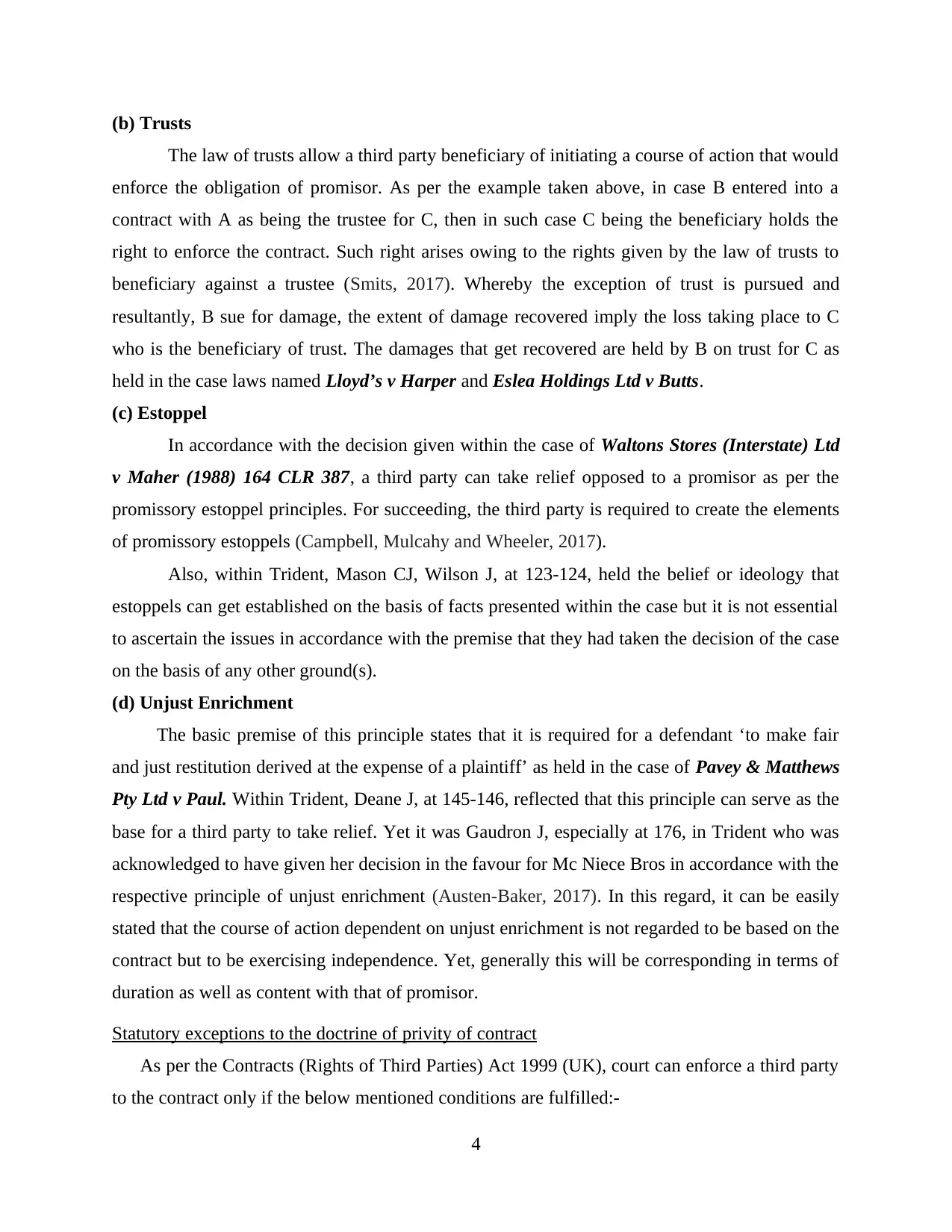
(b) Trusts
The law of trusts allow a third party beneficiary of initiating a course of action that would
enforce the obligation of promisor. As per the example taken above, in case B entered into a
contract with A as being the trustee for C, then in such case C being the beneficiary holds the
right to enforce the contract. Such right arises owing to the rights given by the law of trusts to
beneficiary against a trustee (Smits, 2017). Whereby the exception of trust is pursued and
resultantly, B sue for damage, the extent of damage recovered imply the loss taking place to C
who is the beneficiary of trust. The damages that get recovered are held by B on trust for C as
held in the case laws named Lloyd’s v Harper and Eslea Holdings Ltd v Butts.
(c) Estoppel
In accordance with the decision given within the case of Waltons Stores (Interstate) Ltd
v Maher (1988) 164 CLR 387, a third party can take relief opposed to a promisor as per the
promissory estoppel principles. For succeeding, the third party is required to create the elements
of promissory estoppels (Campbell, Mulcahy and Wheeler, 2017).
Also, within Trident, Mason CJ, Wilson J, at 123-124, held the belief or ideology that
estoppels can get established on the basis of facts presented within the case but it is not essential
to ascertain the issues in accordance with the premise that they had taken the decision of the case
on the basis of any other ground(s).
(d) Unjust Enrichment
The basic premise of this principle states that it is required for a defendant ‘to make fair
and just restitution derived at the expense of a plaintiff’ as held in the case of Pavey & Matthews
Pty Ltd v Paul. Within Trident, Deane J, at 145-146, reflected that this principle can serve as the
base for a third party to take relief. Yet it was Gaudron J, especially at 176, in Trident who was
acknowledged to have given her decision in the favour for Mc Niece Bros in accordance with the
respective principle of unjust enrichment (Austen-Baker, 2017). In this regard, it can be easily
stated that the course of action dependent on unjust enrichment is not regarded to be based on the
contract but to be exercising independence. Yet, generally this will be corresponding in terms of
duration as well as content with that of promisor.
Statutory exceptions to the doctrine of privity of contract
As per the Contracts (Rights of Third Parties) Act 1999 (UK), court can enforce a third party
to the contract only if the below mentioned conditions are fulfilled:-
4
The law of trusts allow a third party beneficiary of initiating a course of action that would
enforce the obligation of promisor. As per the example taken above, in case B entered into a
contract with A as being the trustee for C, then in such case C being the beneficiary holds the
right to enforce the contract. Such right arises owing to the rights given by the law of trusts to
beneficiary against a trustee (Smits, 2017). Whereby the exception of trust is pursued and
resultantly, B sue for damage, the extent of damage recovered imply the loss taking place to C
who is the beneficiary of trust. The damages that get recovered are held by B on trust for C as
held in the case laws named Lloyd’s v Harper and Eslea Holdings Ltd v Butts.
(c) Estoppel
In accordance with the decision given within the case of Waltons Stores (Interstate) Ltd
v Maher (1988) 164 CLR 387, a third party can take relief opposed to a promisor as per the
promissory estoppel principles. For succeeding, the third party is required to create the elements
of promissory estoppels (Campbell, Mulcahy and Wheeler, 2017).
Also, within Trident, Mason CJ, Wilson J, at 123-124, held the belief or ideology that
estoppels can get established on the basis of facts presented within the case but it is not essential
to ascertain the issues in accordance with the premise that they had taken the decision of the case
on the basis of any other ground(s).
(d) Unjust Enrichment
The basic premise of this principle states that it is required for a defendant ‘to make fair
and just restitution derived at the expense of a plaintiff’ as held in the case of Pavey & Matthews
Pty Ltd v Paul. Within Trident, Deane J, at 145-146, reflected that this principle can serve as the
base for a third party to take relief. Yet it was Gaudron J, especially at 176, in Trident who was
acknowledged to have given her decision in the favour for Mc Niece Bros in accordance with the
respective principle of unjust enrichment (Austen-Baker, 2017). In this regard, it can be easily
stated that the course of action dependent on unjust enrichment is not regarded to be based on the
contract but to be exercising independence. Yet, generally this will be corresponding in terms of
duration as well as content with that of promisor.
Statutory exceptions to the doctrine of privity of contract
As per the Contracts (Rights of Third Parties) Act 1999 (UK), court can enforce a third party
to the contract only if the below mentioned conditions are fulfilled:-
4
⊘ This is a preview!⊘
Do you want full access?
Subscribe today to unlock all pages.

Trusted by 1+ million students worldwide
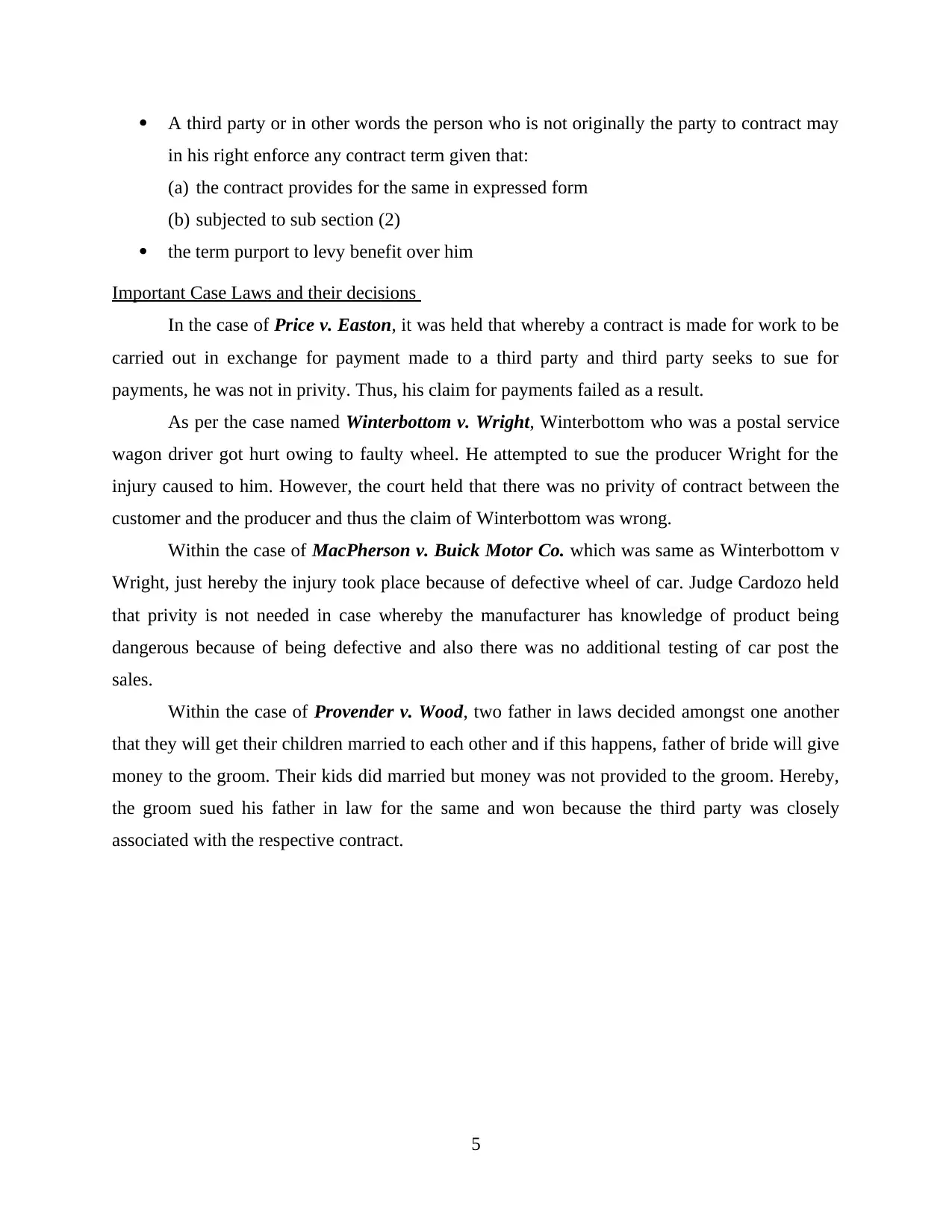
A third party or in other words the person who is not originally the party to contract may
in his right enforce any contract term given that:
(a) the contract provides for the same in expressed form
(b) subjected to sub section (2)
the term purport to levy benefit over him
Important Case Laws and their decisions
In the case of Price v. Easton, it was held that whereby a contract is made for work to be
carried out in exchange for payment made to a third party and third party seeks to sue for
payments, he was not in privity. Thus, his claim for payments failed as a result.
As per the case named Winterbottom v. Wright, Winterbottom who was a postal service
wagon driver got hurt owing to faulty wheel. He attempted to sue the producer Wright for the
injury caused to him. However, the court held that there was no privity of contract between the
customer and the producer and thus the claim of Winterbottom was wrong.
Within the case of MacPherson v. Buick Motor Co. which was same as Winterbottom v
Wright, just hereby the injury took place because of defective wheel of car. Judge Cardozo held
that privity is not needed in case whereby the manufacturer has knowledge of product being
dangerous because of being defective and also there was no additional testing of car post the
sales.
Within the case of Provender v. Wood, two father in laws decided amongst one another
that they will get their children married to each other and if this happens, father of bride will give
money to the groom. Their kids did married but money was not provided to the groom. Hereby,
the groom sued his father in law for the same and won because the third party was closely
associated with the respective contract.
5
in his right enforce any contract term given that:
(a) the contract provides for the same in expressed form
(b) subjected to sub section (2)
the term purport to levy benefit over him
Important Case Laws and their decisions
In the case of Price v. Easton, it was held that whereby a contract is made for work to be
carried out in exchange for payment made to a third party and third party seeks to sue for
payments, he was not in privity. Thus, his claim for payments failed as a result.
As per the case named Winterbottom v. Wright, Winterbottom who was a postal service
wagon driver got hurt owing to faulty wheel. He attempted to sue the producer Wright for the
injury caused to him. However, the court held that there was no privity of contract between the
customer and the producer and thus the claim of Winterbottom was wrong.
Within the case of MacPherson v. Buick Motor Co. which was same as Winterbottom v
Wright, just hereby the injury took place because of defective wheel of car. Judge Cardozo held
that privity is not needed in case whereby the manufacturer has knowledge of product being
dangerous because of being defective and also there was no additional testing of car post the
sales.
Within the case of Provender v. Wood, two father in laws decided amongst one another
that they will get their children married to each other and if this happens, father of bride will give
money to the groom. Their kids did married but money was not provided to the groom. Hereby,
the groom sued his father in law for the same and won because the third party was closely
associated with the respective contract.
5
Paraphrase This Document
Need a fresh take? Get an instant paraphrase of this document with our AI Paraphraser
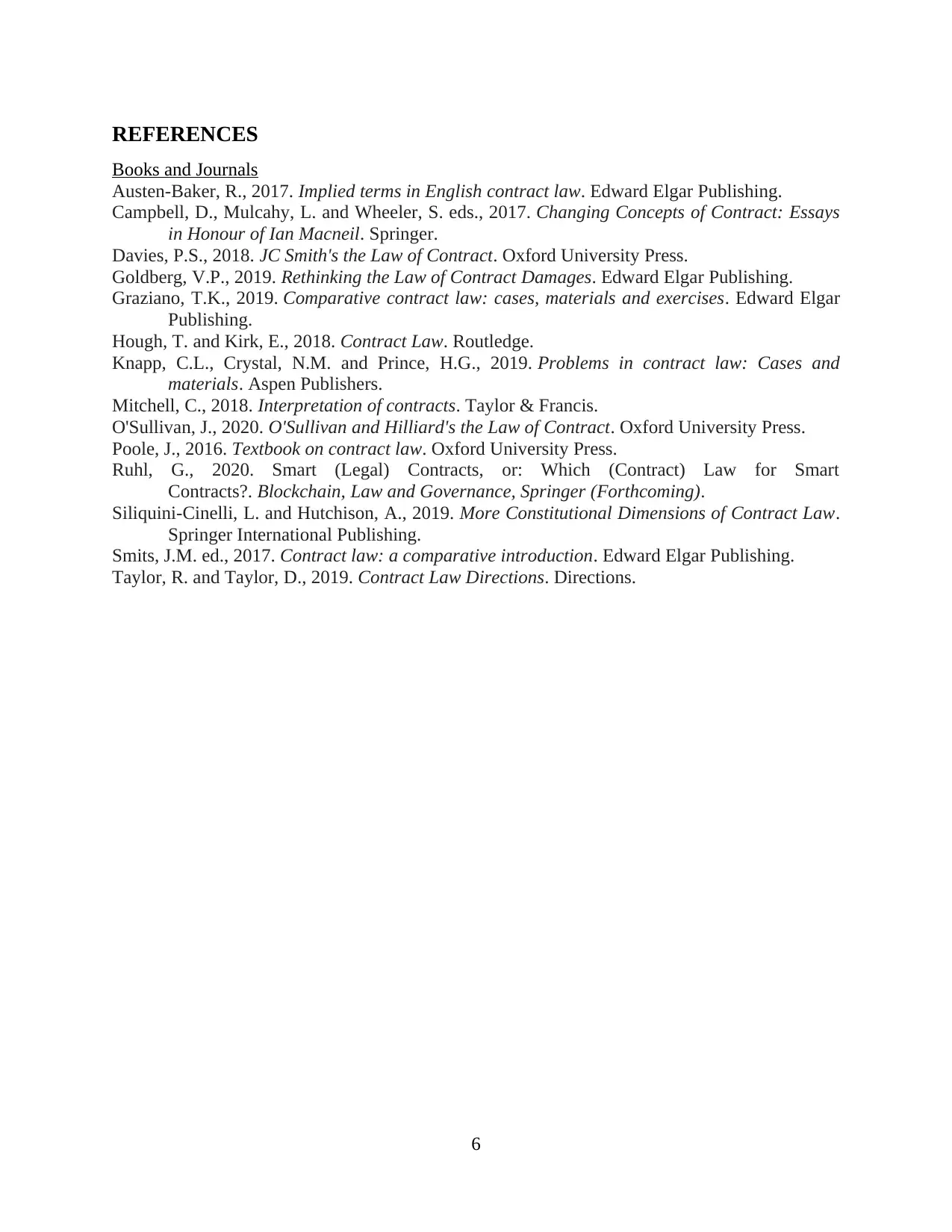
REFERENCES
Books and Journals
Austen-Baker, R., 2017. Implied terms in English contract law. Edward Elgar Publishing.
Campbell, D., Mulcahy, L. and Wheeler, S. eds., 2017. Changing Concepts of Contract: Essays
in Honour of Ian Macneil. Springer.
Davies, P.S., 2018. JC Smith's the Law of Contract. Oxford University Press.
Goldberg, V.P., 2019. Rethinking the Law of Contract Damages. Edward Elgar Publishing.
Graziano, T.K., 2019. Comparative contract law: cases, materials and exercises. Edward Elgar
Publishing.
Hough, T. and Kirk, E., 2018. Contract Law. Routledge.
Knapp, C.L., Crystal, N.M. and Prince, H.G., 2019. Problems in contract law: Cases and
materials. Aspen Publishers.
Mitchell, C., 2018. Interpretation of contracts. Taylor & Francis.
O'Sullivan, J., 2020. O'Sullivan and Hilliard's the Law of Contract. Oxford University Press.
Poole, J., 2016. Textbook on contract law. Oxford University Press.
Ruhl, G., 2020. Smart (Legal) Contracts, or: Which (Contract) Law for Smart
Contracts?. Blockchain, Law and Governance, Springer (Forthcoming).
Siliquini-Cinelli, L. and Hutchison, A., 2019. More Constitutional Dimensions of Contract Law.
Springer International Publishing.
Smits, J.M. ed., 2017. Contract law: a comparative introduction. Edward Elgar Publishing.
Taylor, R. and Taylor, D., 2019. Contract Law Directions. Directions.
6
Books and Journals
Austen-Baker, R., 2017. Implied terms in English contract law. Edward Elgar Publishing.
Campbell, D., Mulcahy, L. and Wheeler, S. eds., 2017. Changing Concepts of Contract: Essays
in Honour of Ian Macneil. Springer.
Davies, P.S., 2018. JC Smith's the Law of Contract. Oxford University Press.
Goldberg, V.P., 2019. Rethinking the Law of Contract Damages. Edward Elgar Publishing.
Graziano, T.K., 2019. Comparative contract law: cases, materials and exercises. Edward Elgar
Publishing.
Hough, T. and Kirk, E., 2018. Contract Law. Routledge.
Knapp, C.L., Crystal, N.M. and Prince, H.G., 2019. Problems in contract law: Cases and
materials. Aspen Publishers.
Mitchell, C., 2018. Interpretation of contracts. Taylor & Francis.
O'Sullivan, J., 2020. O'Sullivan and Hilliard's the Law of Contract. Oxford University Press.
Poole, J., 2016. Textbook on contract law. Oxford University Press.
Ruhl, G., 2020. Smart (Legal) Contracts, or: Which (Contract) Law for Smart
Contracts?. Blockchain, Law and Governance, Springer (Forthcoming).
Siliquini-Cinelli, L. and Hutchison, A., 2019. More Constitutional Dimensions of Contract Law.
Springer International Publishing.
Smits, J.M. ed., 2017. Contract law: a comparative introduction. Edward Elgar Publishing.
Taylor, R. and Taylor, D., 2019. Contract Law Directions. Directions.
6
1 out of 8
Related Documents
Your All-in-One AI-Powered Toolkit for Academic Success.
+13062052269
info@desklib.com
Available 24*7 on WhatsApp / Email
![[object Object]](/_next/static/media/star-bottom.7253800d.svg)
Unlock your academic potential
Copyright © 2020–2025 A2Z Services. All Rights Reserved. Developed and managed by ZUCOL.





